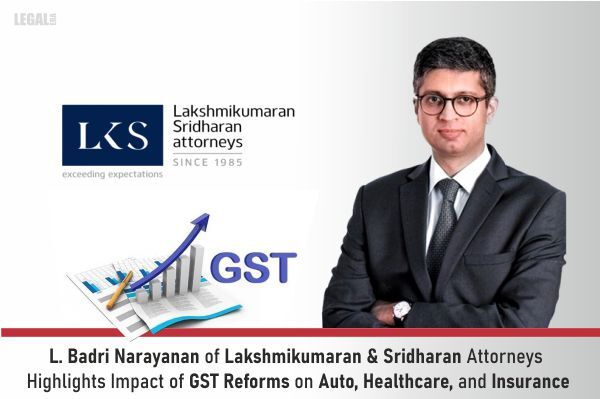
L. Badri Narayanan of Lakshmikumaran & Sridharan Attorneys Highlights Impact of GST Reforms on Auto, Healthcare, and Insurance
Lakshmikumaran & Sridharan Attorneys, a leading law firm in India, shares an analysis of the GST Council’s recent announcements and their impact across key sectors, with insights from L. Badri Narayanan (Executive Partner).
Auto Sector: Across-the-Board Price Reduction
The GST Nex-Gen Reforms are expected to directly boost consumption in the automotive sector. Effective GST rates have been reduced by 10–13% following the withdrawal of the Compensation Cess. Smaller mass-segment cars, three-wheelers, two-wheelers, and commercial vehicles will now attract a lower tax of 18%, reflecting a reduction of 10–13% in the effective rate. SUVs and luxury cars, based on engine capacity and length, will attract 40%, a reduction of 10% from the previous effective rate. The withdrawal of the Cess simplifies compliance and enables cross-utilization of ITC. Compensation Cess paid on transition stock must be mitigated to avoid any adverse impact. While the GST rate on EVs remains unchanged, the reduction to 5% for Fuel Cell Motor Vehicles, including hydrogen vehicles, demonstrates the government’s commitment to the sector. Parts and accessories of motor vehicles have been positively included in the lower-rate regime, reducing classification disputes highlighted in Supreme Court judgments. Clearly defining parts and accessories through stakeholder consultation will bring certainty to the sector. Similar concessions should be extended to the EV sector to reduce working capital impact. The fine print on past-sale discounts will need careful review in light of recent disputes. Overall, the rate reductions are expected to lower costs for the farming and logistics sectors.
Healthcare & Insurance: Affordability and Ease
The GST Nex-Gen Reforms are poised to enhance affordability and access to quality healthcare services, supporting early disease detection. Rate reductions across the healthcare spectrum—including medical devices, surgical apparatus, diagnostic kits, reagents, medical technology items, drugs, and insurance—are positive. Specifically, reductions for glucometers and corrective spectacles are welcomed. Instruments and apparatus for medical, surgical, dental, or veterinary uses for physical or chemical analysis have been reduced from 18% to 5%, along with reagents, which will reduce classification disputes in the sector. Challenges persist due to the inverted duty structure, and anomalies will need correction to avoid blockage of credit. Businesses have a 20-day transition period to prepare for the changes and ensure compliance regarding ITC reversal, common services under ISD, and related provisions. The fine print on past-sale discounts also requires careful attention.
Insurance
Reduction in the GST rate on life and health insurance for individuals addresses long-pending demands. The resultant loss of ITC for companies will directly impact the cost of doing business, which may influence policy premiums in the long term and support greater market penetration. IRDAI may need to review premiums to mitigate short-term impacts from ITC loss. Clear guidance is required on hybrid policies offering life cover and investment returns, such as annuities, ULIPs, group policies, and FMC products. Businesses have a 20-day transition period to prepare for ITC reversals, common services under ISD, and other compliance requirements.
Click to know more about Lakshmikumaran & Sridharan Attorneys
If you have a news or deal publication or would like to collaborate on content, columns, or article publications, connect with the Legal Era News Network Team and email us at [email protected] or call us on +91 8879634922.